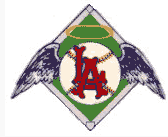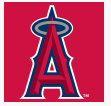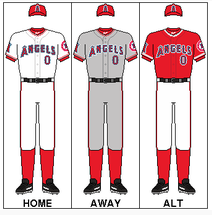
Los Angeles Angels of Anaheim
USINFO | 2013-06-19 11:53
The Los Angeles Angels of Anaheim are a professional baseball team based in Anaheim, California, United States. The Angels are a member of the Western Division of Major League Baseball'sAmerican League. The "Angels" name is a tribute to the minor league team, Los Angeles Angels. The Angels have been based in Angel Stadium of Anaheim since 1966. The Angels franchise of today was established in the MLB in 1961 through former owner Gene Autry, the team’s first Major League owner who bought the rights to continue the franchise name from Walter O'Malley, the formerLos Angeles Dodgers owner who acquired the franchise from Phil Wrigley, the owner of the Chicago Cubs at the time.
In 2009, the Angels were AL Western Division champions for the third straight season. 2012 marked the tenth straight year in which the Angels franchise had drawn more than three million fans in attendance for the regular baseball season.[1] In 2011, ESPN ranked the Los Angeles Angels #4 on its list of Ultimate Team Rankings ahead of every team in baseball and any franchise in Los Angeles.[2]
Franchise history
Main article: History of the Los Angeles Angels of Anaheim

The "Los Angeles Angels" name originates from the first Los Angeles based-sports team, the Los Angeles Angels, who took the name "Angels" from the English translation of "Los Angeles", which means "The Angels" in Spanish. The team name started in 1892; in 1903, the team name continued in L.A. through the Pacific Coast League, which is now a minor league affiliate of MILB. The Angels franchise of today was established in MLB in 1961 after former owner Gene Autry bought the rights to continue the franchise name from Walter O'Malley, the former Los Angeles Dodgers owner who had acquired the franchise from Phil Wrigley, the owner of the Chicago Cubs at the time. As stated in the book Under the Halo: The Official History of Angels Baseball, "Autry agreed to buy the franchise name for $350,000, and continue the history of the previously popular Pacific Coast League team as his own expansion team in the MLB."[3] After the Angels joined Major League Baseball, some players from the Angels' PCL team joined the MLB Angels in 1961.
An expansion franchise, the club continued in Los Angeles as the Los Angeles Angels, and played their home games at Los Angeles' Wrigley Field (not to be confused with Chicago's stadium of the same name), which had formerly been the home of the PCL Los Angeles Angels. The Angels, along with the Washington Senators(now Texas Rangers), were the first expansion team in Major League Baseball. The team then moved in 1962 to newly-built Dodger Stadium, which the Angels referred to as Chavez Ravine, where they were tenants of the Los Angeles Dodgers through 1965.
The team's founder, entertainer Gene Autry, owned the franchise for its first 36 years. During Autry's ownership, the team made the playoffs three times, but never won the pennant. The team has gone through several name changes in their history, first changing their name to the California Angels on September 2, 1965, with a month still left in the season, in recognition of their upcoming move to the newly constructed Anaheim Stadium in Anaheim at the start of the 1966 season.[4] When The Walt Disney Company took control of the team in 1997, it extensively renovated Anaheim Stadium, which was then renamed Edison International Field of Anaheim. The City of Anaheim contributed $30 million to the $118 million renovation with a renegotiated lease providing that the names of both the stadium and team contain the word "Anaheim".[5] The team was renamed the Anaheim Angels and became a subsidiary of Disney Sports, Inc. (later renamed Anaheim Sports, Inc.). Under Disney's ownership and the leadership of manager Mike Scioscia, the Angels finally won their first pennant and world championship in 2002.
In 2005, new owner Arturo Moreno added "Los Angeles" to the team's name in order to better tap into the team's history and appeal to more Los Angeles fans as in the team's past. He also stated that as Los Angeles is the second largest market in the U.S., its addition would benefit the team greatly. In compliance with the terms of its lease with the city of Anaheim, which required "Anaheim" be a part of the team's name, the team was renamed the Los Angeles Angels of Anaheim. Hotly disputed when initially announced, the change was eventually upheld in court and the city finally dropped its four-year legal battle in 2009. The team usually refers to itself as the Angels or Angels Baseball in its home media market, and the words "Los Angeles" and "LAA" do not appear in the stadium, on the Angels' uniforms, or on official team merchandise. Local media in Southern California tend to omit a geographic identifier and refer to the team asthe Angels or as the Halos. The Associated Press, the most prominent news service in the U.S., refers to the team as the Los Angeles Angels, the Angels, or Los Angeles.[6]
Prelude: The American League comes to Los Angeles
For many years, there had been talk of an existing American League team relocating to L.A. the largest city in California and the West coast. In 1940, the St. Louis Browns asked AL owners for permission to move to Los Angeles, but were turned down. They planned another move for the 1942 season, and this time got permission from the league. A schedule was even drawn up including Los Angeles, but the bombing of Pearl Harbor in December 1941 made major-league sports of any sort on the West Coast unviable. In 1953, there was again talk of the Browns moving to L.A. for the 1954 season, but the team was sold and moved to Baltimore instead as the Orioles. There were on-again, off-again discussions between city officials and the Washington Senators regarding a possible move. There were also rumors that the Philadelphia Athletics' move to Kansas City in 1955 was a temporary stop on the way to Los Angeles.
In the end it was the National League that first came to the city, in the form of the Brooklyn Dodgers. Dodgers owner Walter O'Malley purchased the Pacific Coast League(PCL)'s Los Angeles Angels in early 1957 from Chicago Cubs owner Phil Wrigley. Under the rules of the time, he also acquired the rights to a major league team in Los Angeles, which he used to move the Dodgers there a year later. Under ordinary circumstances, that would have precluded any subsequent American League presence in the Los Angeles area. However, in an effort to prevent the proposed Continental League from becoming a reality, in 1960 the two existing leagues agreed to expand, adding two new teams to each league. Though the understanding was that expansion teams would be placed in cities without major league baseball, that agreement quickly broke down. When the National League placed a team in New York (the Mets) as its tenth franchise, the American League announced plans to place an expansion team in Los Angeles, to begin play in 1961.
The inception of a franchise
The team has an owner
Gene Autry, former movie cowboy, singer, actor and owner of Golden West Broadcasters (including Los Angeles' KMPC radio and KTLA television), attended the Major League Owners’ meeting in St. Louis in 1960 in hopes of winning broadcasting rights for the new team’s games. Hall of Famer Hank Greenberg was initially on the fast track to be the team's first owner, with Bill Veeck as a partner. However, when O'Malley got word of Veeck's involvement, he invoked his exclusive right to operate a major league team in Southern California. In truth, O'Malley wasn't about to compete with Veeck, who was known as a master promoter. After it became obvious that O'Malley would never sign off on the deal as long as Veeck was a part-owner, Greenberg was forced to bow out. After another bid by Chicago insurance executive and future A's owner Charlie Finley failed, Autry was persuaded to make a bid himself. Autry (who had been a minority stockholder in the Angels' PCL rival, the Hollywood Stars) agreed, and purchased the franchise.
The team gets its name
Autry named the new franchise the Los Angeles Angels. The origins of the name date back to 1892, when it was first used by a Los Angeles franchise in the California League. The Angel moniker has always been natural for Los Angeles teams, since The Angels is a literal English translation of the Spanish Los Angeles. It was also a nod to the long-successful PCL team that played in Los Angeles from 1903 through 1957. O'Malley still owned the rights to the Angels name even after moving the team to Spokane to make way for the Dodgers, so Autry paid O'Malley $300,000 for the rights to the name.
The 1960s: early AL years
Angels in Los Angeles
The Angels and their fellow expansionists, the new Washington Senators (now the Texas Rangers) chose players from other American League teams in an expansion draft. In 1961, the first year of the team’s existence, the Angels finished 70-91 for a .435 winning percentage, still the highest winning percentage ever for a first-year major league expansion team. Moreover, they not only finished 9 games ahead of the Senators, but also 9 games ahead of the Kansas City Athletics. The 1961 Angels featured portly first baseman Steve Bilko, a long-time fan favorite, having played many years with the PCL Angels. Another favorite was the diminutive (5' 5-3/8") center fielder, El Monte native Albie Pearson. The Angels played that inaugural season at Wrigley Field in South Los Angeles, the longtime home of the PCL Angels and also of the syndicated television series Home Run Derby.
1962
Main article: 1962 Los Angeles Angels season
In 1962, under the terms of their agreement with O'Malley, the Angels moved to Dodger Stadium, which they would refer to as Chavez Ravine. That year, the Angels were a contender for the American League pennant for most of the season, even leading the American League standings on July 4, before finishing in third place, 10 games behind the New York Yankees, who won their 27th American League pennant. On May 5 of that year, Bo Belinsky tossed the first no-hit game in the history of Dodger Stadium/Chavez Ravine, blanking the Orioles 5-0.
1964
Main article: 1964 Los Angeles Angels season
In 1964, the Halos again finished fifth in the American League, and pitcher Dean Chance won the Major League Cy Young Award that year. The need for a new stadium became more and more evident. It was thought the Angels would never develop a large fan base playing as tenants of the Dodgers. Also, O'Malley imposed fairly onerous lease conditions on the Angels; for example, he charged them for 50% of all stadium supplies, even though the Angels at the time drew at best half of the Dodgers' attendance.
1966
Hittin' the Road: the move from Los Angeles to Anaheim
Stymied in his attempt to get a new stadium in Los Angeles, Autry looked elsewhere. His first choice for a stadium was the site offered by the city of Long Beach. However, the city insisted the team be renamed the Long Beach Angels, a condition Autry refused to accept. Autry said it's an ideal minor league city for an Angels farm team that didn't last long in the California League and Pacific Coast League. He was able to strike a deal with the suburban city of Anaheimin Orange County 25 miles southeast of downtown L.A. on Interstate 5 adjacent to Disneyland, and construction began on Anaheim Stadium (nicknamed The Big A by Southern Californians), where the Angels moved in 1966. On September 2, 1965, team ownership announced the Los Angeles Angels would thenceforth be known as the California Angels, in anticipation of the team's move to Anaheim the following year. They were the second Major League baseball team to be named after an entire state, following the Minnesota Twins. At the time, though they were one of three major league teams in the state of California, the Angels were the only American League team in the state. (Despite the move of the Kansas City Athletics to Oakland in 1968, the Angels retained their California moniker through 1996.) They were also the first Major League Baseball team that was originally from California (The Dodgers, as well the Giants were from New York, the A's were from Kansas City, and Philadelphia before that, and the Padres were granted Major League status after the Angels.) But it is thought the team's namesake representing the state included a spring training site in the affluent winter resort city Palm Springs 80 miles to the east where team owner Gene Autry lived, the team played some pre-season and April exhibition games there from its inaugural season (1961) for the next three decades to 1992.
In their last year at Chavez Ravine, the Angels drew only 566,727 paying customers. In their 1966 inaugural year in Anaheim, the Angels drew over 1.4 million, leading the American League in attendance. In 1967, their second year in Anaheim, the Angels contended for the American League pennant as part of a five-team pennant race (along with Chicago, Detroit, Minnesota and eventual winner Boston) before fading in late August, but eventually became the "spoilers" by defeating Detroit at Tiger Stadium in the last game of the regular season to give Boston its first AL pennant in 21 years. In 1970, the Angels finished third in the AL Western Division and Alex Johnson became the first (and so far only) Angel to win an American League batting title.
The 1970s: Nolan Ryan and the playoffs
The Ryan express
During the 1970s, although Angel fans endured some mediocre years on the field they also were able to enjoy the heroics of fireballer Nolan Ryan, who tossed four of his seven no-hitters as an Angel.[7] He also set several strikeout records throughout his career, most notably a 383-strikeout mark in 1973, still a major league record. Ryan was acquired in a trade that sent Jim Fregosi to the Mets. Ryan had been a middle relief pitcher on the "Miracle Mets" team that captured the 1969 World Series. Ryan's feats caused him to be named the Ryan Express, after the 1965 film Von Ryan's Express, which starred Frank Sinatra. His prowess, combined with that of fellow moundsman Frank Tanana, produced the refrain, "Tanana, Ryan and Two Days of Cryin'", a derivative of the refrain, "Spahn and Sain, then pray for rain," coined when Warren Spahn and Johnny Sain anchored the pitching staff of the then Boston Braves in the 1940s.
Ironically, the 1970s came to a close with the decision by then-general manager Buzzie Bavasi to allow Ryan to become a free agent. At the time, Bavasi remarked that Ryan, whose 1979 record was 16-14 (Ryan was 26-27 under Bavasi), could be replaced "with two pitchers who go 8-7." Bavasi later admitted this was "the worst mistake" he ever made in all his years in baseball."[8]
1979: Angels finally reach the playoffs
Main article: 1979 California Angels season
The Angels won their first American League West Division championship in 1979 under manager Jim Fregosi, a former Angel shortstop who was sent to the New York Mets in 1972 as part of the trade that brought Nolan Ryan to the Angels. Don Baylor became the first designated hitter to win the American League Most Valuable Player award. Other contributors to the team, which featured a powerful offense, were Bert Campaneris, Rod Carew, Dan Ford and Bobby Grich. However, the Angels lost what then was a best 3-out-of-5 ALCS to the Baltimore Orioles, managed by Earl Weaver, three games to one. The Halos won Game 3 at home, scoring twice in the bottom of the 9th inning to shade Baltimore 4-3.
The 1980s: A decade of frustration
1979 had been the Angels' last season at the "old" Big A. The Los Angeles Rams football team agreed to move to Anaheim for the 1980 season, with seating increased to almost 65,000. The expansion completely enclosed the stadium, replacing the view of the San Gabriel and Santa Ana Mountains with three decks of gray concrete. In the 1980s, like many other baseball teams of that era, the Angels learned the difficulties of marketing the team while playing in a multi-purpose facility with a seating capacity too large for baseball.
Share this page






















